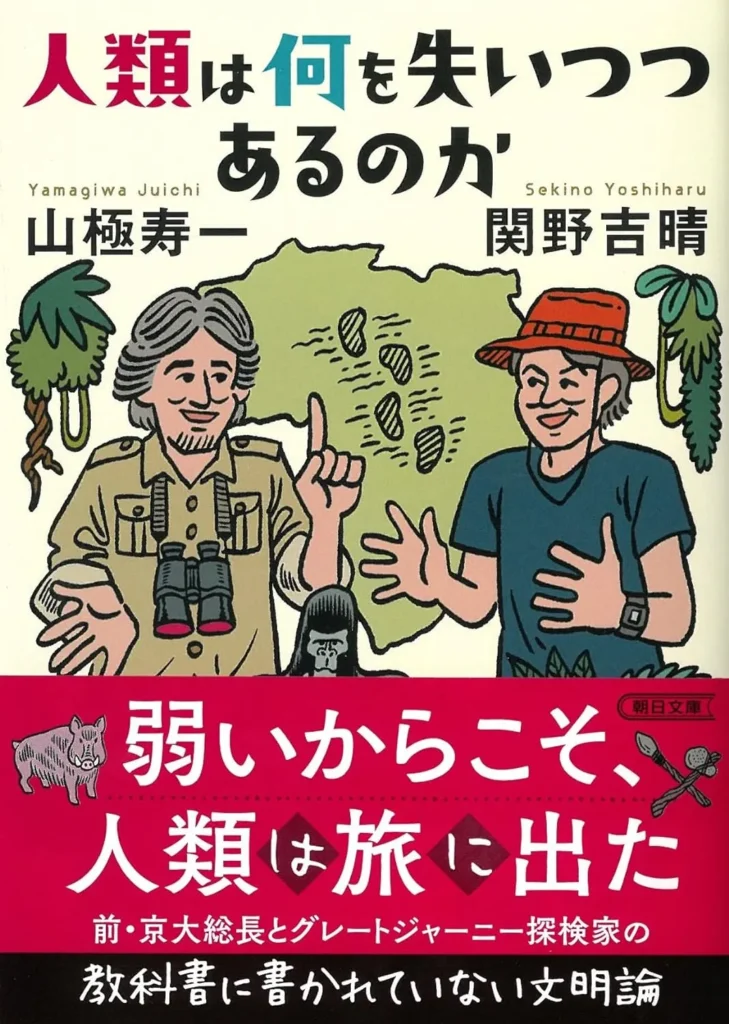
The Book in 3 Sentences
- The book offers the two authors’ exploration into the gradual erosion of essential aspects of humanity.
- Through the abundance of anecdotes and analysis, they suggest the diverse dimensions of this loss, including cultural heritage, ecological balance, and societal values.
- They prompt the readers to reflect on the implications for the future of humankind and the planet and inspire hope for a more conscientious and sustainable future if humanity collectively addresses these pressing challenges.
Impressions
How Did I Discover It?
While spending time at my mother’s place, I came across this book on her bookshelf, which piqued my interest because of her fondness for Juichi Yamagiwa’s work.
Who Should Read It?
- I recommend this book to individuals interested in existential questions about humanity’s trajectory and those concerned about preserving cultural heritage, environmental sustainability, and societal values.
- It would appeal to readers who enjoy thought-provoking nonfiction that delves into pressing global issues and encourages reflection on our collective responsibility to shape a better future.
- This book may also be valuable to educators, policymakers, and activists seeking insights into humanity’s challenges and potential solutions.
How the Book Changed Me
- Reconsidering Eating Habits: The book prompted me to reconsider my eating habits in terms of economic pressures and societal trends. It made me appreciate the cultural significance of shared meals and the importance of preserving these traditions. Since I moved out of my parents’ home, I have become accustomed to eating meals alone. However, I have learned how these seemingly minor habits of mine can have broader social implications for our society and interpersonal relationships. It inspired me to be more mindful of how my choices impact both myself and those around me, encouraging me to prioritize meaningful connections and social cohesion in my interactions with others.
- Acknowledging Self-Awareness: I’ve realized the critical importance of self-awareness in navigating life’s journey. Knowing our own desires and ambitions is fundamental not just for personal fulfillment but also for receiving guidance from those around us. I am reminded to strive for greater self-awareness and seek guidance as I journey toward realizing my goals and potential.
- Navigating Life with Long-Term Vision: The book reminded me of the importance of maintaining a long-term perspective in navigating life’s challenges. It prompts me to consider the balance between short-term goals and long-term vision in my own life, encouraging me to cultivate patience, resilience, and a willingness to learn from failure as I strive to achieve my goals and contribute to society’s broader progress.
My Top 3 Quotes
- “When considering the phenomenon of “eating alone,” one cannot overlook its economic background. Today, we live in an era where economic efficiency precedes almost every aspect of life. Eating alone is also a result of this trend. The time that used to be sufficient for meals rapidly diminishes due to increasing abbreviation and efficiency. Convenience stores and fast-food outlets have emerged due to the pursuit of convenience and free time by eliminating the hassle of cooking. While meals are sometimes consumed alone, in every culture, people tend to eat the same food in the same place with family or friends. Meals serve as a social tool or, in other words, a platform for communication. People gather for communication; conversely, communication has been facilitated by people facing each other and sharing meals. In a sense, communal dining was supposed to be a means of building society.” (「孤食」について考えるうえでは、経済的な背景が見逃せません。現代は何につけても経済性、効率性を最優先する時代です。孤食もそこに繫がっている。いままで食事するために十分にあった時間が、どんどん省略化、効率化されて減ってしまっている。コンビニエンスストアやファストフード店は、調理する手間を省いて、自由な時間を持つという利便を追い求めた結果、作られたものです。 もともと食事はひとりで食べる場合もあるかもしれませんが、どの民族でも家族や仲間と同じ場所で同じ物を食べようとする。食事は社会的な道具、言い換えればコミュニケーションの場です。コミュニケーションのために人は集まり、逆に、人が互いに対面して食事をすることでコミュニケーションは成り立ってきた。いわば共食は社会を作る手段だったはずなんですね。)
- “If a person doesn’t know what they want, there’s no way those around them can offer guidance. I believe this is one of the major issues in contemporary society. Many young students today don’t know what they want to do, so education cannot fully serve its purpose.” (何をしたいのか、本人がわからなければ、周囲の人は言葉のかけようがありません。 ぼくは、ここが現代社会の大きな問題のひとつだと思います。いまの若い学生たちは、自分がいったい何をしたいのか、わからない人が多い。だから教育も力を発揮できない。)
- “The lack of space for nurturing individuals with an eye on the future ten or twenty years later is not unique; it also applies to other industries. Present-day Japan has adopted a societal trend that demands the seamless completion of tasks in a short period. However, without the patience to wait or the tolerance for failure, people cannot grow. In such an environment, the overall atmosphere of society will eventually stagnate.” (十年後、二十年後を見越して人を育てるゆとりがなくなってしまったのは、ほかの業種でも同じでしょう。現在の日本は、そんなふうに社会全体が短期間でそつなく仕事をこなすことを求める風潮になった。しかし、待つ余裕、失敗を許す余裕がなければ、人は育ちません。これでは、最終的には社会全体の空気が淀んでしまいます。)